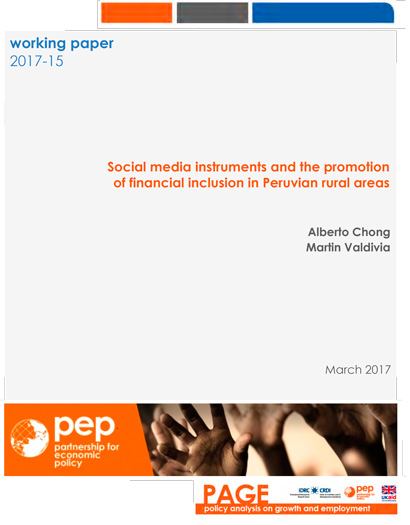Social media instruments and the promotion of financial inclusion in peruvian rural areas
| Año | : | 2017 |
|---|---|---|
| Autor/es | : | Alberto Chong, Martín Valdivia |
| Área/s | : | Empleo, productividad e innovación |
Chong, Alberto; Martín Valdivia (2017). Social media instruments and the promotion of financial inclusion in peruvian rural areas. PEP-PIERI Working Paper, 2017-15. PEP.
This study seeks to evaluate the use of short soap operas as a mechanism to promote the use of formal savings accounts among poor rural women that have been secularly excluded from healthy interactions with the formal financial sector. The authors developed a short soap opera (telenovela), named Josefa, which transmitted pro-savings messages using characters and stories that could generate a level of identification with the intended audience. Researchers used an experimental design that randomly assigned eligible villages of Huancavelica, the poorest department in Peru, to treatment and control groups, and organized special viewing sessions inviting all beneficiaries of Juntos, the Peruvian CCT program, in the eligible villages. A year later, they found that women who were exposed to the treatment have an improved knowledge and attitude towards formal savings, especially for precautionary motives. The authors did not find a significant change at the end of bimester savings balances until the July-August bimester, which they interpret as evidence that the improved pro-savings attitude remained latent for several months, until right about the time cash surpluses are likely, due to post-harvest season. In searching for the underlying mechanisms, researchers find no income effect, but a strong empowerment effect within the household, mainly for economic and financial decisions, and especially among the women under 40, which is also the group that shows more robust temporary savings effects. Overall, they interpret these results as evidence that the edutainment approach can have an important contribution to the financial inclusion of poor rural women that have faced secular exclusion from formal financial institutions like the ones from the Peruvian Southern Sierra.







